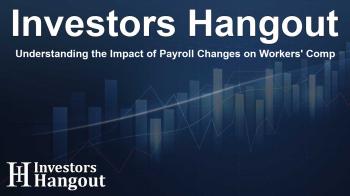Understanding the Impact of Payroll Changes on Workers' Comp

The Influence of Payroll on Workers' Compensation Insurance
Hiring new employees and promoting current workers can have surprising effects on a business's financial landscape, particularly concerning workers' compensation insurance costs.
Key Factors Affecting Workers' Comp Premiums
To comprehend how workers' comp premiums are determined, let's delve into the essential components that insurers consider.
Employee Classification Rate
Insurance companies assign a specific workers' comp class code to businesses, which is based on the nature of the business activities and the jobs that employees perform. Each class code corresponds to a rate that reflects the risks associated with those job functions.
Payroll Estimations
Total compensation is a fundamental factor in the calculation. At the beginning of the policy year, employers are required to estimate their payroll for the upcoming year and provide this information to their insurer. This estimate forms the basis of the projected premium.
At the end of the policy year, an audit is conducted to verify the actual payroll. If the initial estimate was overly conservative, the business may receive a credit or refund. Conversely, an underestimation would necessitate an additional payment to the insurer.
Experience Modification Factor
The experience modification factor (e-mod) plays a critical role in premium calculations. This multiplier is designed to adjust premiums based on a business's safety record and claims history. Businesses with minimal claims may enjoy lower premiums due to a lower e-mod, while those with a higher-than-average claim rate could face increased costs.
A neutral e-mod is defined as 1.00. If a business has fewer claims, their e-mod may dip below 1.00, resulting in decreased premium rates. However, filing more claims than average will push the e-mod above 1.00, leading to higher insurance costs.
Understanding the Workers' Compensation Calculation
With these key factors outlined, let's explore how they intertwine to influence workers' comp insurance costs:
Rate x (Payroll / 100) x e-mod = Premium
Both payroll changes, such as hiring new staff or granting raises, can substantially affect workers' compensation premiums. Essentially, there’s a direct link between payroll size and premium costs.
Moreover, various types of compensation can also impact this dynamic. For example, the National Council on Compensation Insurance (NCCI) expands the definition of payroll to include commissions, bonuses, overtime pay, and other forms of remuneration.
Planning for Payroll Costs to Avoid Surprises
To prevent unexpected expenses at the close of the policy year, it is vital for businesses to make accurate payroll estimates and adjust coverage as necessary throughout the year. When employers hire new talent, offer raises, or promote employees, they should revise their workers’ compensation coverage accordingly.
By understanding the influence of payroll on workers' compensation costs and planning proactively, employers can secure appropriate coverage without overspending.
Contact Information
For more information, please reach out to Liz Johnson, Director, Public Relations.
Frequently Asked Questions
What are the main factors influencing workers' comp premiums?
The key factors include employee classification rates, payroll estimations, and the experience modification factor.
How does payroll affect workers' compensation costs?
Payroll is directly tied to premium calculations, where increases in payroll can lead to higher insurance costs.
What is the experience modification factor?
The experience modification factor is a multiplier that adjusts premiums based on a company’s claim history and safety performance.
Why is accurate payroll estimation crucial?
Accurate payroll estimation helps avoid unexpected charges and ensures businesses get the proper coverage for their needs.
What types of compensation is considered in payroll?
Payroll not only includes salaries and wages but also commissions, bonuses, and overtime compensation.
About Investors Hangout
Investors Hangout is a leading online stock forum for financial discussion and learning, offering a wide range of free tools and resources. It draws in traders of all levels, who exchange market knowledge, investigate trading tactics, and keep an eye on industry developments in real time. Featuring financial articles, stock message boards, quotes, charts, company profiles, and live news updates. Through cooperative learning and a wealth of informational resources, it helps users from novices creating their first portfolios to experts honing their techniques. Join Investors Hangout today: https://investorshangout.com/
Disclaimer: The content of this article is solely for general informational purposes only; it does not represent legal, financial, or investment advice. Investors Hangout does not offer financial advice; the author is not a licensed financial advisor. Consult a qualified advisor before making any financial or investment decisions based on this article. The author's interpretation of publicly available data presented here; as a result, they should not be taken as advice to purchase, sell, or hold any securities mentioned or any other investments. If any of the material offered here is inaccurate, please contact us for corrections.
